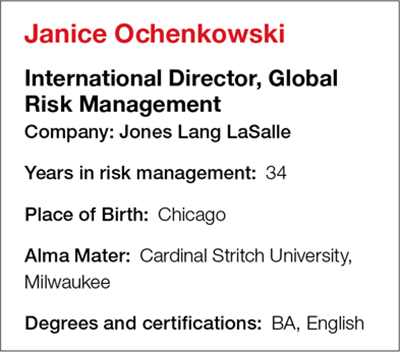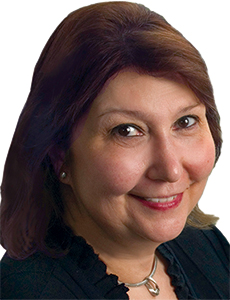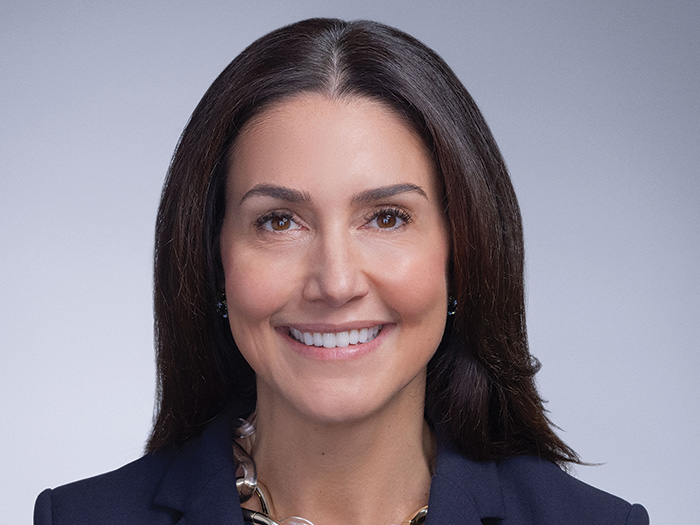Risk Management
The Profession
R&I: What was your first job?
I was in high school and taught baton twirling at a dance studio.
R&I: How did you come to work in risk management?
My story is “right place/right time.” An employment agency sent me on the interview. LaSalle Partners was looking for someone who would grow into a risk management position and I wanted a defined career path. I was not familiar with risk management and didn’t have any special interest in it at the time.
 R&I: What is the risk management community doing right?
R&I: What is the risk management community doing right?
[Risk managers are] looking at risk in a more holistic manner not just in terms of policy silos. They feel more empowered to reach upward in their organizations, and to participate in management discussions about the business of their businesses. Also, more individuals have advanced degrees in risk management so they are entering organizations at a more senior level.
R&I: What could the risk management community be doing a better job of?
Risk managers could be more strategic in their approach and more confident in the impact that sound risk management — not insurance purchasing — decisions have on the success of their organizations. As a discipline we could do better at self-promotion — speaking out about the work we do and its criticality to our businesses. Risk managers often tout the experience of their brokers and insurers, leaving an image in their organization that they just coordinate rather than add value.
R&I: What’s been the biggest change in the risk management and insurance industry since you’ve been in it?
I’ve lived the evolution of the discipline from insurance buying to true risk management. The sophistication of risk managers has increased, there are more known and quantifiable risks facing organizations, and regulatory agencies are asking about how risk is managed and demanding transparency of risk evaluations. All of this has led to the C-suite and corporate board or organizational trustees being much more interested in the risk management process. And that’s a huge change.
R&I: What emerging commercial risk most concerns you?
Cyber is one. I think there are internal processes and firewalls you can impose but they are not absolute in covering expenses, and there are insurance policies to buy but they don’t cover the entirety of the exposure.
R&I: What insurance carrier do you have the highest opinion of?
The best way for me to answer that is to describe the ideal insurer: It’s a company that takes the time to understand the risk and differentiates it from the class into which it is grouped, with premium reflecting credit for risk mitigation efforts. It has efficient management of administrative matters such as documentation of insurance, invoicing and policy issuance. In the event of a claim there is prompt and thorough investigation with timely resolution. Through each phase, there is excellent communication with the client. The true differentiator among companies is a willingness to help solve a business problem, which may mean creating a unique insurance solution.
R&I: Do you feel that the contingent commission controversy is overblown?
No I don’t. I think at its essence the controversy was about transparency and about the openness between the broker and the client regarding what compensation the broker was earning from a transaction and whether there was a proper alignment of interest. Because of the controversy there can now be an open dialogue on the issue.
R&I: Are you optimistic about the US economy or pessimistic and why?
I’m a glass half full person so I’m optimistic. The economic reports being issued by the government and industry associations indicate that we are recovering but there is a way to go for full recovery.
R&I: Who is your mentor and why?
I’ve been fortunate to have many mentors throughout my life. My parents always encouraged me to follow my dreams, and gave me their unconditional support, for instance. At Cardinal Stritch University, I was encouraged to try new things and to think of myself as a leader, which I had never done before. My managers at JLL as well as fellow risk managers have helped me to work through difficult issues as well. At each stage of my life I’ve been fortunate to have at least one person to guide me.
R&I: What have you accomplished that you are proudest of?
I’m very proud of the way risk management is regarded within JLL. We are regarded as part of the business process, not an afterthought.
R&I: What’s the best restaurant you’ve ever eaten at?
One of the most memorable meals I’ve had was a champagne brunch at Domaine De Chandon in Napa, Calif. Unfortunately, it’s now closed.
R&I: What is the most unusual or interesting place you have ever visited?
I traveled to Egypt in 2010, rode a camel, visited mosques and pyramids, cruised the Nile, had dinner with a family in their Cairo home, and it was absolutely fascinating. I was so fortunate to be there before so many of the artifacts and tourist areas were destroyed.
R&I: What is the riskiest activity you ever engaged in?
I’m a risk manager. I avoid risks.
R&I: If the world has a modern hero, who is it and why?
Our society is so cynical now that we look for flaws rather than accomplishments. We’re more interested in the “gotcha” moments than examples of brilliance. So sadly, world-accepted heroes are hard to find. I think we’ve moved away from the grand names; today we look for our heroes among our peers and neighbors. We celebrate the individuals who are making a small but measurable difference in our neighborhoods and towns.
R&I: What about this work do you find the most fulfilling or rewarding?
The creativity of risk management is what I think is the most rewarding. Many people think there isn’t creativity in our discipline, but if you do it right there can be. Finding a unique way to avoid or manage a risk that allows the business to move forward is very rewarding.
R&I: What do your friends and family think you do?
That’s a great question, because of course, most of them have no idea. They do know I’m involved in RIMS but they think it’s an annual trip to a conference, and more recently to Washington where I have been doing lobbying for TRIA [Terrorism Risk Insurance Act]. My relatives think I sell insurance, because they don’t understand how someone could have a full time job and staff to just buy insurance.











